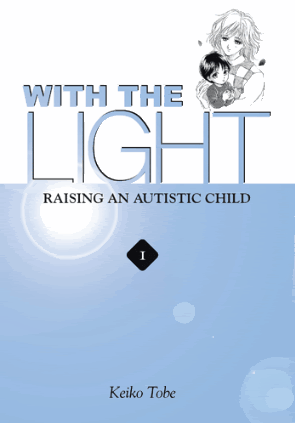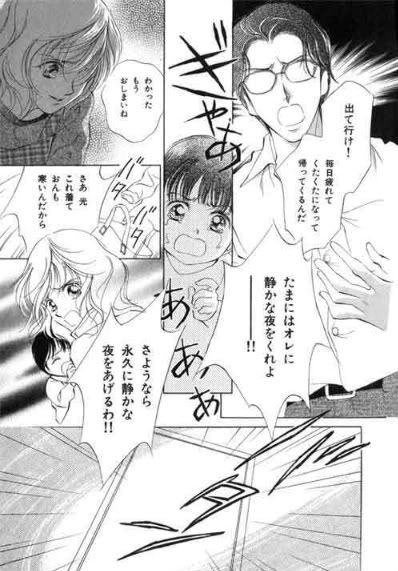The Manga Masterpiece of “With The Light”
Within the past couple of months, I have became a total fanboy for the new manga publisher Yen Press. With their manga anthology Yen Plus coming out in a couple of weeks and the release of The Melancholy of Haruhi Suzumiya coming out next year, I really see a great future ahead for these guys. But my first taste from this publisher actually came at the suggestion of Del Rey’s Dallas Middaugh. During a Q&A panel last year, someone asked Mr. Middaugh about his favorite manga series not released by Del Rey. His answer was Yen Press’s With the Light – Raising an Autistic Child by Keiko Tobe, and he was quite adamant about how much he enjoyed it.

With this suggestion, I picked up the first volume of the series shortly afterwards. Yen Press combines two volumes of the Japanese edition for each American release, making each volume much larger than your average manga. But you only pay $15 for what’s pretty much two entire books, and trust me, it is worth every penny of it…
Mr. Middaugh’s suggestion was dead on because With the Light would become the best comic I have read in years… and that’s saying a lot considering just how much manga I’ve read during that time.
When the young mother Sachiko Azuma gives birth to her first son, she is so happy and optimistic about parenting that she names the boy Hikaru, meaning “to shine” in Japanese. But from very early on in his development, Sachiko notices the boy acting much differently than all the other kids his age. While all the other kids began to walk and start saying their first words, Hikaru remains quiet and unresponsive to his mother or anyone. When Sachiko brings him to the hospital to check on his hearing, the doctors diagnose the boy with Autism, a very serious – and very real – mental disorder.
So begins the lifelong struggle for Sachiko as she attempts to raise Hikaru in modern Japanese society. Every thing that should be easy and normal in life now becomes an obstacle that the new mother must overcome. She must search for any day care center that will accept a mentally challenge child, and this problem continues on with every new preschool and elementary school that Hikaru has to enroll in. She also has to care for her boy without being able to communicate with him like you would any other child. Hikaru is constantly walking off on his own and getting himself in awkward and sometimes very dangerous situations, and it’s up to his mother to find him and apologize for any trouble he may cause. And all the while, Sachiko has to put up with the gossip and judgments of all the other parents who blame the mother for the boy’s odd behavior.
It is this kind of general ignorance towards Autism that I found to be the most disturbing aspect of Tobe’s comic. Almost every person that encounters Hikaru in this story acts as if they have never heard of mental disorders before, nor can they even fathom the idea after Sachiko goes through the formalities of explaining it them. They continue to assume that the kid is simply misbehaving, and they get very angry towards the boy and his mother. I’m constantly wondering to myself, “Can’t these people tell the boy is handicapped?!?”
Perhaps it’s Japanese culture that’s the problem here. The word for Autism in Japanese is “juheishou,” which translates to “self-closing syndrome.” It’s the “self-closing” part of the word that makes most people believe that Autistic people make a self decision to close themselves off to the world, like a hikikomori or something. So they all believe that the boy is choosing to be unresponsive and socially disruptive, and reflect poorly on the helpless mother because of it.
Or perhaps it’s just my personal experience growing up the way I did. I have an aunt on one side of my family and a cousin on the other side who are both mentally handicapped. Because of this, my own mother spent most of her career helping out those with disabilities. So maybe I’m little more aware and understanding about Autism then the average person.
But still, it just shouldn’t be this difficult for people to understand Autism and mental disabilities, and if Tobe’s research into dealing with the disorder really did show this kind of ignorance in the general public, then it is a very huge problem indeed.

This type of ignorance and misunderstanding is the most painful at the very beginning of the story when Hikaru’s own parents fail to understand the disorder. Sachiko and her husband, Masato, become very abusive for the first couple of chapters. Even as Sachiko comes to grips with the situation, the father remains distant and eventually walks out on his family. Without the father’s support and help, the story becomes too brutal and almost impossible to read. Tobe realizes this flaw and fixes it in a very quick and sloppy manner. Masato has a sudden “realization” and turns from the worst possible bastard to father-of-the-year within only a few pages.
This is probably the biggest flaw the story, but once you can get past this hurdle, you will start to see why this book is really special.
Because Sachiko suffers so much in the story, whenever life throws any sort of help and support towards her and Hikaru, it becomes a huge relief and joyous occasion. Hikaru makes many friends in his life that understand his condition and help him out. A little girl named Moé becomes friends with Hikaru when they are toddlers, and she grows up to become a surrogate big sister to him and continues to nurture him even as they go well into their elementary school years. A classroom volunteer, Ishida, becomes a surrogate big brother to Hikaru and defends him while the other kids tease him. And Sachiko is even lucky enough to find Aoki-sensei, an incredible special ed teacher who is able to make huge progress in the boy’s education.
Because it’s so hard for Hikaru, all the simple events that take place in a child’s life – playing games with other kids, performing a dance at the school assembly, being able to mutter the word “Mommy” – become emotionally climatic moments for Sachiko and the reader when they actually occur. We’d never expect such trivial things to be so important until they appear to be lost forever. It’s so emotionally powerful that it left this 23-year-old dude crying out tears of joy many times while reading it. I have never seen a book that ever portrayed parenting, friendship, and simple human kindness this beautifully before.
With the Light doesn’t have action sequences, magical transformations, frilly costumes, or slapstick humor. It’s a manga that does not fit into any kind of classification your average American otaku would be familiar with. It is a very real look at living with Autism and exposes the hardship one endures in a society clearly ignorant of it. But through the hardships, this comic shows the beauty of human kindness and understanding, and reminds us all of how important the simple things in a child’s life really are.
It is a masterpiece of manga, and it is an experience unlike any I have ever had as a fan of the medium. Bravo for Keiko Tobe for doing the research into the issue and creating such a wonderful story to portray it in. And bravo to Yen Press for bringing this clearly difficult and unique title to the US so that we can all have a chance to enjoy it. If you want to read an emotionally powerful manga unlike anything out there right now, you owe it to yourself to check out With the Light – Raising an Autistic Child.